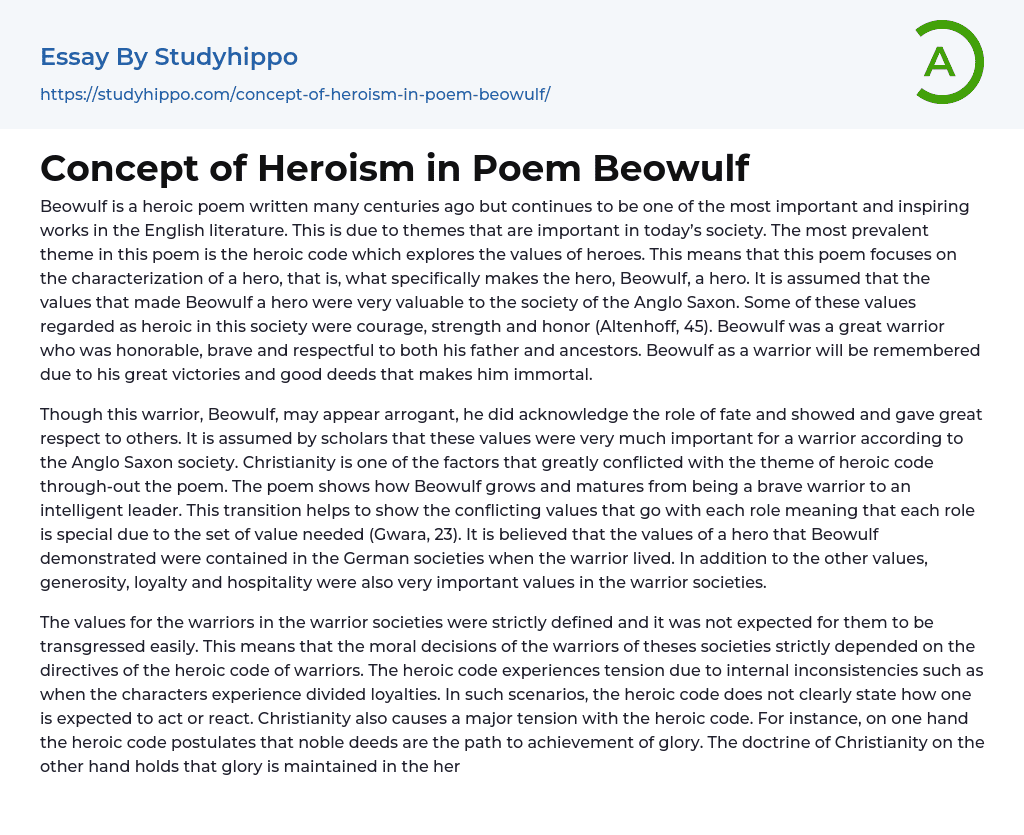Beowulf, a heroic poem written centuries ago, remains a vital and inspirational piece in English literature.
The poem emphasizes themes that are significant in contemporary society, with the most prominent theme being the heroic code that delves into the ideals of heroes. Therefore, the poem centers on characterizing Beowulf as a hero and identifying what attributes specifically define him as such. It is inferred that the Anglo Saxon society highly esteemed the values that rendered Beowulf heroic. Examples of these esteemed values within their society included courage, strength, and honor (Altenhoff, 45).
Beowulf was a courageous and respectful warrior who honored his father and ancestors. He will be forever remembered for his exceptional triumphs and honorable acts, which grant him immortality. Although this warrior, Beowulf, may seem arrogant, he did recognize the power of fate and displayed great respect towards others. Scholars
...believe that these values held immense significance for a warrior in Anglo Saxon society. Throughout the poem, Christianity emerges as a conflicting force with the heroic code.
The poem illustrates Beowulf's development from a courageous warrior to a wise leader. This transformation highlights the contrasting values associated with each role, emphasizing the uniqueness of each role. According to Gwara (23), Beowulf's heroic qualities reflect the values upheld in German societies during his time. Aside from these qualities, generosity, loyalty, and hospitality were also highly valued in warrior communities.
The warrior societies had strict definitions for their values, which were not easily transgressed. Therefore, the moral decisions of the warriors in these societies were dependent on the directives of the heroic code of warriors. However, there are internal inconsistencies within the heroic code that create tension, especially when
characters have divided loyalties. In such situations, the heroic code does not provide clear guidelines for appropriate action or reaction. Christianity also contributes to the tension with the heroic code.
The heroic code and Christianity have differing beliefs about obtaining glory. According to the heroic code, glory is achieved through noble actions in this life, while Christianity teaches that glory is obtained in the afterlife. Additionally, warriors prioritize seeking revenge instead of grieving, whereas Christians believe in forgiving those who harm them. Beowulf's journey from being a warrior to becoming a leader highlights the contrasting values of a good warrior and a good king within societies that emphasize warfare. Initially, as a warrior, Beowulf risks everything for personal glory since he has nothing to lose and his desires revolve solely around it.
Being a leader, he has the duty to prioritize the safety of his people above his own honor and ensure their protection. This responsibility entails praising his warriors, who work hard to earn it. The poem captures the impact of Christianity during a period when the Anglo Saxons were transitioning from Paganism. While incorporating pagan ideas, Beowulf also recognizes God as his guardian throughout.
He states that without God's protection, he would have lost his fight immediately. Other illustrations of Christian values depicted by Beowulf include rescuing the Danes from Grendel and an aversion to using a weapon as a symbol of fairness. The concepts of heroism, loyalty, and generosity all align with the principles of Christianity. Beowulf can be likened to Christ in Christian doctrine, especially when he endeavors to assist the people. Conversely, Grendel can be compared to Satan, as he strives to undermine
the welfare and joy of individuals.
Beowulf's final battle against a powerful dragon is seen as an emblem of Satan's might. Recognizing the deadly venom, Beowulf chooses to use a fair weapon. Despite the difficulty of the fight, Beowulf ultimately fails to defeat the venomous dragon. This confrontation can be compared to Christ's sacrifice, where he gave his life for humanity, similar to Beowulf (Gwara, 68). The dragon symbolizes the evil individuals must confront in order to protect goodness in life.
The poem emphasizes that all material possessions, including wealth and success, are bestowed upon humans by God. The instance of Beowulf encountering a weapon in Grendel's mother's cave serves as an illustration. Instead of claiming credit for his perception, Beowulf attributes it to God. Similarly, King Hrothgar later informs Beowulf that his kingship is a result of God's grace.
The king in Beowulf emphasizes the significance of approaching earthly success with humility and sharing it, as given by God, to prevent doom (Helder, 55). This demonstrates that a good king should not fearfully protect their possessions but be ready to distribute them. The poem also acknowledges that God grants wisdom and power to humanity. Additionally, the Christian author of Beowulf aims to attract a Christian audience by harmonizing pagan ideas such as revenge, renown, destiny, and monarchy with Christianity while emphasizing the interconnectedness of both faiths.
Beowulf, at the conclusion of the poem, is likened to Christ, who sacrificed his own life for the salvation of others (Gwara, 70). Throughout his battles, Beowulf invoked God, the ruler of mankind, and constantly sought His favor in determining the outcome.
Works cited
- Altenhoff, Sebastian. Warior Values in "beowulf"
and "the Wanderer". , 2011. Internet resource.
Print.




